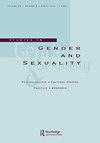糟糕的未来,糟糕的历史
Q3 Social Sciences
引用次数: 0
摘要
摘要本文运用让·拉普兰切关于人类学基本情况和“事后”(après coup)概念的理论,探讨1978年的电影《秋天的德国》。通过这些概念过滤器,文章考察了电影中的虚构表现,电影制作背后的真实人物,以及他们与德国人记忆和忘记纳粹政权事件的关系。本文章由计算机程序翻译,如有差异,请以英文原文为准。
Bad Future, Bad History
ABSTRACT This essay deploys theories from Jean Laplanche regarding the fundamental anthropological situation and the notion of afterwardsness, or après coup, to explore the 1978 film Germany in Autumn. Through these conceptual filters, the article examines the fictional representations within the film, the actual persons behind the making of the film, and their relationship to German remembering and forgetting of the events of the Nazi regime.
求助全文
通过发布文献求助,成功后即可免费获取论文全文。
去求助
来源期刊

Studies in Gender and Sexuality
Social Sciences-Gender Studies
CiteScore
0.80
自引率
0.00%
发文量
15
期刊介绍:
Beginning in the final two decades of the 20th century, the study of gender and sexuality has been revived from a variety of directions: the traditions of feminist scholarship, postclassical and postmodern psychoanalytic theory, developmental research, and cultural studies have all contributed to renewed fascination with those powerfully formative aspects of subjectivity that fall within the rubric of "gender" and "sexuality." Clinicians, for their part, have returned to gender and sexuality with heightened sensitivity to the role of these constructs in the treatment situation, including the richly variegated ways in which assumptions about gender and sexuality enter into our understandings of "normality" and "pathology."
 求助内容:
求助内容: 应助结果提醒方式:
应助结果提醒方式:


